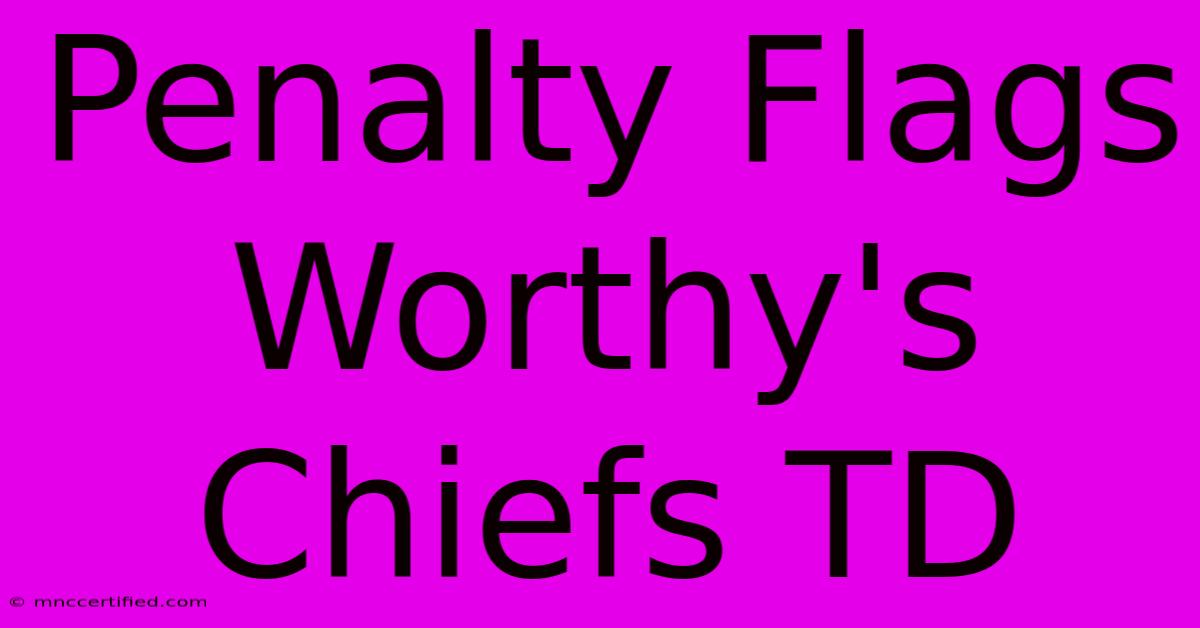Penalty Flags Worthy's Chiefs TD

Table of Contents
Penalty Flags Worthy's Chiefs TD: Controversy and the NFL's Officiating
The Kansas City Chiefs' thrilling touchdown drive in [insert game details, e.g., the AFC Championship game against the Bengals] ended with a controversial play that sparked debate among fans and analysts alike: a crucial penalty flag that could have drastically altered the game's outcome. This article delves into the specifics of the penalty, examines the rule interpretations, and explores the wider implications for NFL officiating.
The Play in Question: A Breakdown
The controversial play involved [insert specific details of the play, e.g., a crucial fourth-down conversion by Travis Kelce]. Initially, the play appeared to be a successful completion, a pivotal moment in a tight game. However, a flag was thrown, signaling [insert the specific penalty called, e.g., holding] against [insert the player penalized, e.g., a Bengals defender]. This penalty ultimately gave the Chiefs a first down, setting the stage for their eventual touchdown.
The Controversy: Was the Penalty Justified?
The immediate aftermath saw a flurry of opinions. Some argued the penalty was clearly justified, pointing to [insert specific evidence supporting the penalty call, e.g., video replays showing a clear hold]. Others maintained the call was questionable, suggesting the contact was minimal or incidental, not significant enough to warrant a penalty in such a high-stakes situation. This divergence of opinion highlights the inherent subjectivity in officiating, even with the aid of instant replay. The debate also raises questions about the consistency of penalty enforcement across different games and referees.
The Impact of the Penalty: Shifting Game Momentum
The penalty's impact on the game cannot be overstated. By negating what would have been a crucial turnover on downs, it effectively handed the Chiefs a new set of downs in field goal range. This significantly altered the momentum of the game, giving the Chiefs the opportunity to score a touchdown and take a commanding lead. Without the penalty, the outcome of the game could have been drastically different.
Examining the NFL's Officiating Standards
The incident further underscores the ongoing debate about the consistency and accuracy of NFL officiating. The league continually works to improve its officiating procedures, using technology such as replay reviews and advanced training programs. However, subjective calls like holding remain a source of controversy, as they often depend on the referee's judgment and interpretation of the rules. This calls for greater transparency and perhaps, a more robust appeals process for crucial penalty calls.
The Wider Implications for the NFL
The controversy surrounding this penalty has implications beyond just this specific game. It highlights the ongoing need for the NFL to address concerns about officiating accuracy and consistency. This could involve further investments in technology, enhanced training for referees, or perhaps even exploring alternative officiating models. The goal is to ensure fairness and minimize the impact of controversial calls on the outcome of games. Public perception of officiating directly influences fan engagement and the overall credibility of the sport.
Conclusion: A Call for Improvement
The penalty flag on the Chiefs' crucial touchdown drive sparked a significant debate about officiating in the NFL. While the league strives for accuracy and consistency, instances like this highlight the challenges and the need for continued improvements. Whether you believe the penalty was justified or not, the incident raises important questions about the rules, the judgment of officials, and the overall impact of officiating on the integrity of the game. The ongoing conversation about these issues is vital for the future of the NFL.

Thank you for visiting our website wich cover about Penalty Flags Worthy's Chiefs TD. We hope the information provided has been useful to you. Feel free to contact us if you have any questions or need further assistance. See you next time and dont miss to bookmark.
Featured Posts
-
Review And Updates Beyonces 2024 Halftime
Dec 26, 2024
-
Chiefs Steelers Game Swift No Show
Dec 26, 2024
-
Call The Midwife Premiere Emotional First Moments
Dec 26, 2024
-
Doctor Who Christmas 2024 Recap
Dec 26, 2024
-
Doncic Out Calf Strain Vs Timberwolves
Dec 26, 2024